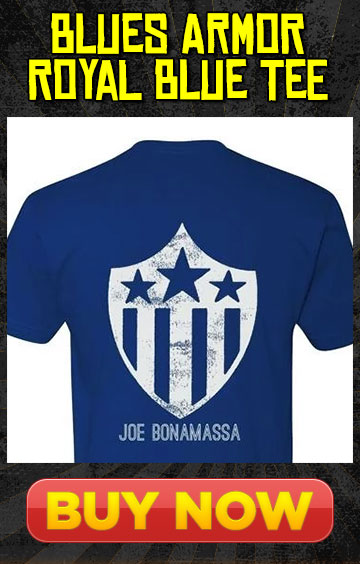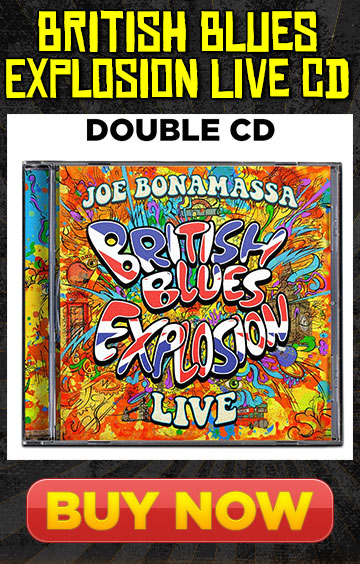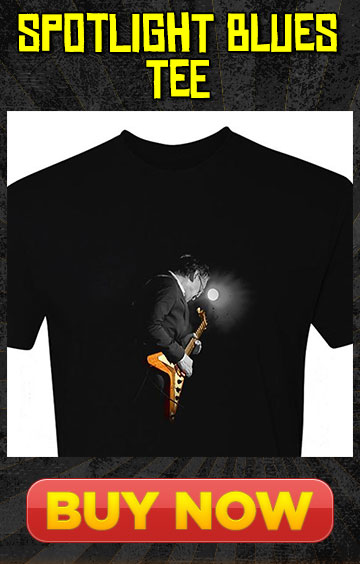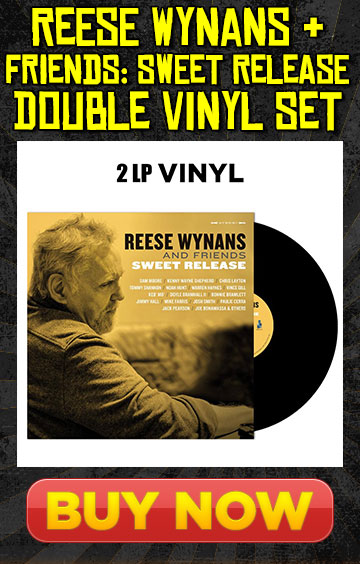



Joe's Top 10 Blues-Rock Guitar Solos of All Time

Cream, "Crossroads"
Wheels of Fire, 1968
"We could start here - Cream live at Winterland, 1968. To me, if you're talking about an uptempo-song solo, the way Eric Clapton structured it with the call and response, the way he leaves the gaps, the way he uses the sound, it's perfect. It's one of those things where the sound is part of the solo, you know? And he really embraced the Gibson [ES-]335 and the Marshall. You can listen to it over and over again and you just go, 'That's such a beautiful moment of pure thought and pure heart and soul.'"

Gary Moore, "Still Got the Blues"
Still Got the Blues, 1990
"Gary Moore was a big guy for me, absolutely. Between Gary Moore and Walter Trout, those two really opened up the doorways for a guy like me to be successful in Europe. This solo, there's melody, there's intensity and there's light and shade within the intensity. And you can hear how he picks and how the dynamics of the notes vary within the solo. And then there's the payoff, how he saves the speed and t he firepower for the end. This is a solo that I think really shines as one of the best ever."

Rory Gallagher, "Cradle Rock"
Irish Tour '74, 1974
"I love Rory's slide playing on this. I don't know, it just seems like the Irish and the British had a different way of phrasing things. They defaulted to a different harmonic thing, and you can hear that here. When Rory played slide it sounded like him - even though he's just playing slide in E, which everybody from Ry Cooder to myself have attempted, and, you know, Ry perfected. But Rory's playing slide in E, and it's like, 'Man, is that an open tuning?' No, it's standard. He just has a certain way of phrasing. That's in your upbringing, your DNA. Kinda like the difference between Chicago blues and Mississippi Delta blues. You go, 'These guys come from a different spot.' Same thing when you listen to Ronnie Earl and Duke Robillard and those guys from the East Coast, or Mike Bloomfield when he was hanging out in San Francisco. It's a geographical thing."

Jeff Beck, "Let Me Love You"
Truth, 1968
"This was the first time I heard a Les Paul used as a weapon. I was very intrigued with that. It sounds angry and vital. It sounds like Jeff's out to prove himself and to show everybody he's the man. And you're like, 'Wow, it's just a Les Paul and a Marshall.' But the way he played it was extremely new. And Jeff's been able to reinvent himself five, six decades since then and he's still the best rock guitar player in the world. It's amazing what he's done. I was introduced to Jeff Beck through this song, and I would say this is my 'favorite Jeff Beck.' It's basically the archetype for Led Zeppelin and heavy metal and harder rock in a British format."

Free, "Don't Say You Love Me"
Fire and Water, 1970
"I think Paul Kossoff definitely had a Marshall and a [Fender] Super Reverb here. You can hear the Fender/Marshall combo, and the tone is beautiful. And he has his Les Paul on the front pickup but it's howling. And his vibrato and phrasing and the way he executed those notes is incredible. You know, the thing about Free that sounded so heavy was the fact Andy Fraser played an SG bass through a Marshall an octave below Koss. So Kossoff would play these kinds of 'inside' fifths and Andy would play the bottom, and it sounded like one big fat Gibson guitar. It was just amazing what they did with a four-piece. It's absolutely the example of how to use space and restraint in a rock-blues format."

Ry Cooder, "Paris, Texas"
Paris, Texas soundtrack, 1984
"If you want to play slide guitar, I would listen to this, and to the whole soundtrack in general. There's a certain thing that Ry has that he invented that's never been duplicated. To me, the three slide players that I've looked up to are Ry Cooder, David Lindley and Lowell George. Those are my guys. Lowell had a wonderful thing, and David Lindley has a wonderful thing. And Ry has a wonderful thing, and it's just an incredibly original sound. There's no one else that sounds like him."

Bonnie Raitt, "Thing Called Love"
Nick of Time, 1989
"Bonnie is another one you can put in there. She plays slide, and you know it's Bonnie Raitt and you just go, 'How do you do that with a Stratocaster and a glass slide?' It's because she just has a way of phrasing and it's in the DNA and it's intrinsic. You hear what she does with this song, a John Hiatt song, and you go, 'Wow, it's just super original.' It's very restrained, but super effective. Then you put that voice on top of it and it's just like, 'Yes! That's it!' To me, Bonnie Raitt is one of the most underrated guitar players of all time."

Robin Trower, "Bridge of Sighs"
Bridge of Sighs, 1974
"Robin probably got his fair share of criticism back in the day for being very, you know, Hendrix-derivative, especially because he came out just post-Hendrix passing away. But you listen to records like Bridge of Sighs and Long Misty Days and you can hear that his style is so incredibly original. With this song it's like, you'd never heard a guitar sound that wide. It was just the way he played, where he let the Stratocaster bloom with the Marshall and the Uni-Vibe. He could play any Strat through any amp and it sounds like him. It's just the way he lets the guitar bloom."

Ronnie Earl, "Backstroke"
Plays Big Blues, 1997
"Ronnie's version of Albert Collins' 'Backstroke' is an example of how to make a Strat through a Super Reverb sound incredibly vital. Sometimes just a Fender guitar plugged into a Fender blackface amp sounds a little thin or sinewy. But Ronnie's sound was always big and ballsy. He'd plug straight into the Supers and set them for stun."

B.B. King
Blues Is King, 1967
"The whole record! It's just a 355 through a [Fender] Twin, but it's so easily identifiable and it's just a perfect sound and perfect playing. The guitar is an extension of the vocal and the vocal is an extension of the guitar. They're married and totally simpatico."
Source: Guitar World Magazine, November Issue













